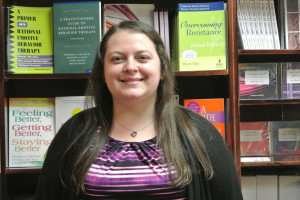by Amanda Rosinski, M.A.
I recently completed a presentation for my program at school, which I knew was going to have a large impact on my student status. There are four levels in my program, and successfully completing this presentation would mean that I would move up to a new level. So there were high stakes for this presentation, and as I was preparing for it, I began feeling the pressure of those high stakes. Having a healthy level of concern would be a helpful emotional reaction. But I began feeling quite anxious instead. I wanted the presentation to go perfectly. It was more than that though, I was demanding that the presentation go perfectly. What would it mean if the presentation didn’t go perfectly? It would mean there was a mistake or a stumbling block in my presentation, and that would be awful. I would not be able to survive if that happened. It would mean that I’m not a good student. As these thoughts and beliefs kept running through my mind, they fueled my feelings of anxiety. So I began to challenge them.
Functionally, was holding these irrational beliefs helping me to prepare for my presentation? Not at all. Was having these irrational beliefs hurting me as I prepared for my presentation? Absolutely. Not only were they distracting, they increased my anxiety and they were exhausting. I also began to think about how I’ve supported my other classmates as they have prepared for their presentations, and thought about how I offered encouragement and support for them. Why wasn’t I doing that for myself, too? We’re often harder on ourselves than we are on our friends or family. Of course I preferred that the presentation go perfectly, but there was no rule that it absolutely had to go perfectly. Even if there was a mistake or stumbling block in the presentation, it wouldn’t mean that the entire presentation was suddenly awful. And I have certainly made mistakes before and survived through them, so I would survive this time, too. A mistake would not mean I was an entirely bad student, only that I had made a mistake. Students are humans too, and humans make mistakes. As I started changing my beliefs into these more helpful ones, I began to feel my anxiety change back to concern, which helped me to prepare for the presentation successfully. Now that I reflect back on the presentation, there were a few stumbling blocks, but I did survive them. Not only did I survive them, I was also still able to complete the presentation successfully and move up to a new level in my program!

